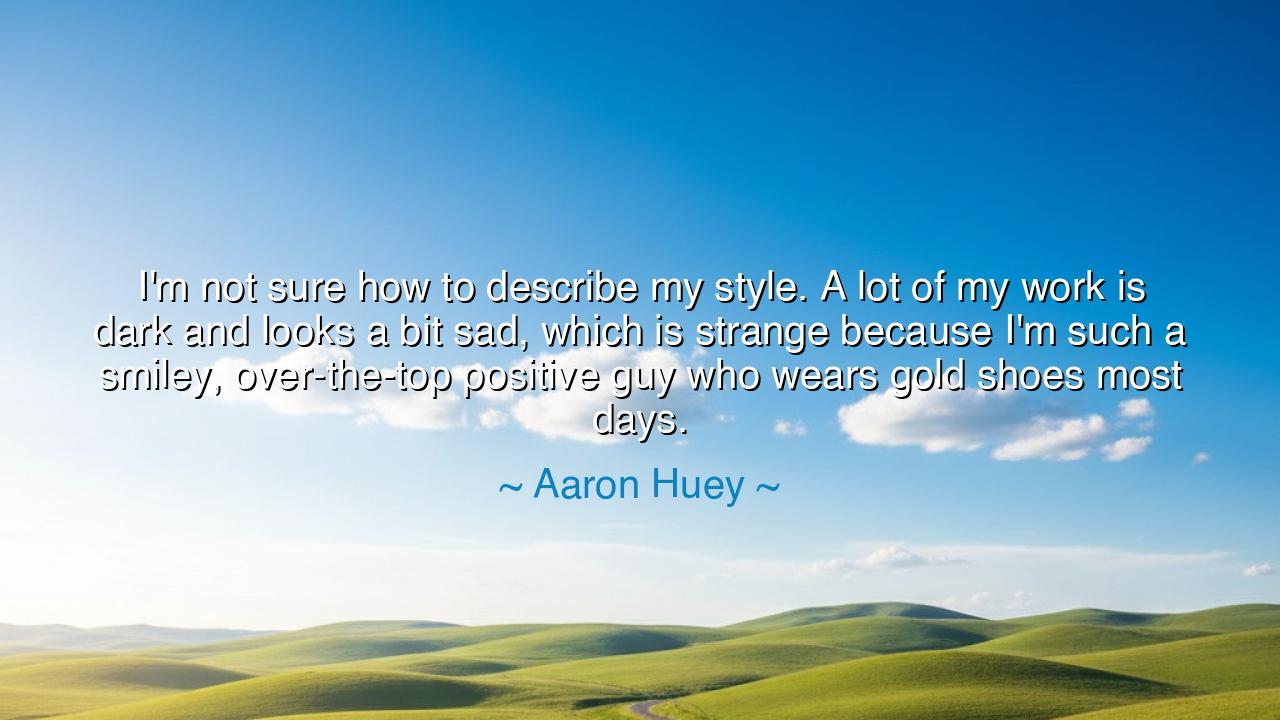
I'm not sure how to describe my style. A lot of my work is dark
I'm not sure how to describe my style. A lot of my work is dark and looks a bit sad, which is strange because I'm such a smiley, over-the-top positive guy who wears gold shoes most days.






Hearken, children of reflection, to the words of Aaron Huey, who confesses: "I'm not sure how to describe my style. A lot of my work is dark and looks a bit sad, which is strange because I'm such a smiley, over-the-top positive guy who wears gold shoes most days." In these words lies a meditation upon the duality of the human spirit, the paradox between inner disposition and creative expression, and the profound complexity that marks every soul. Since the days of the ancients, philosophers and poets have recognized that the surface of a being may conceal depths of sorrow, reflection, or insight, and that true artistry often arises from this tension.
The ancients understood that contrast is the essence of beauty. Aristotle spoke of the harmony between light and shadow, joy and grief, in both character and art. Huey’s acknowledgment that his work is dark and sad, while his persona is bright and exuberant, reflects this eternal principle: creation channels aspects of the human condition that may not be visible outwardly. The artist becomes a mirror, revealing hidden currents of emotion that exist even within lives marked by laughter and positivity.
Consider the life of Michelangelo, whose sculptures and paintings teem with both grandeur and sorrow. Though he was revered in society and celebrated for his achievements, his journals and correspondence reveal a man often troubled by doubt, mortality, and the burden of creation. Huey’s words echo this duality: the exterior brightness does not preclude the depth of dark or sad reflection, and it is within this interplay that art achieves resonance and power.
The quote also speaks to the paradoxical nature of human expression. Huey’s smiley and positive demeanor contrasts sharply with the tone of his work, illustrating that personal cheerfulness does not limit the exploration of deeper or heavier themes. The ancients recognized this complexity; Socrates, while engaging with citizens jovially, probed the profound questions of virtue, suffering, and the soul. Art, like philosophy, often conveys what speech alone cannot, revealing the hidden depths of human experience.
Furthermore, the gold shoes serve as a symbol of individuality, of external exuberance that does not diminish the seriousness of one’s work. Huey’s style is a testament to the multiplicity of human identity: one may be joyful and flamboyant while simultaneously grappling with weighty emotions and dark insights. History teaches that such paradox is fertile ground for creative genius: the ability to embody both extremes grants perspective, empathy, and the capacity to communicate universal truths.
From this reflection emerges a timeless lesson: embrace the complexity within yourself, acknowledging both light and shadow. Creativity often arises not from a single emotional state, but from the tension between contradictory forces. Huey teaches that the duality of being—the co-existence of positivity and melancholy—is not weakness, but a source of richness and authenticity in expression.
Practical actions follow naturally. Observe and honor your own emotional contrasts, understanding that what you feel inwardly may differ from what you project outwardly. Use these tensions as fuel for creative, reflective, or problem-solving endeavors. Celebrate your quirks, symbols, and outward joys—like Huey’s gold shoes—while channeling deeper emotional currents into meaningful work, recognizing that both are essential to the human story.
Remember, children of the ages, that the human spirit is layered and paradoxical. Aaron Huey’s words illuminate the enduring truth that darkness and cheerfulness, sorrow and exuberance, coexist within us all. By embracing this duality, we cultivate authenticity, insight, and creative power, learning that the depth of one’s inner life can enrich both the art we produce and the joy we share with the world.






AAdministratorAdministrator
Welcome, honored guests. Please leave a comment, we will respond soon